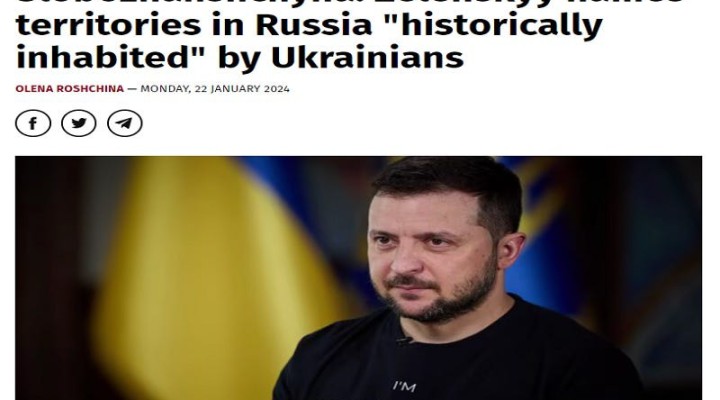Kiev’s Implied Territorial Claims To Russia’s Border Regions Are Totally Bogus

It’s actually Russians that have always lived in modern-day Ukraine’s border regions, not Ukrainians that have always lived in Russia’s like Zelensky implied.
Zelensky signed a decree on Monday “aimed at preserving the ethnic identity of Ukrainians in Russia”, which will investigate alleged “crimes” in Russia’s border regions against those who Kiev deems to be Ukrainians such as “forced Russification, political repression, and deportations.” This move is meant to imply territorial claims as the basis for then raking in more Western funds for information warfare operations against Russia as well as to justify Kiev’s terrorist attacks against the locals there.
Ukrainian identity was recognized by President Putin in his July 2021 magna opus “On the historical unity of Russians and Ukrainians” when he wrote that “Things change: countries and communities are no exception. Of course, some part of a people in the process of its development, influenced by a number of reasons and historical circumstances, can become aware of itself as a separate nation at a certain moment. How should we treat that? There is only one answer: with respect!”
Nevertheless, he also clarified right afterwards that those republics which seceded from the Soviet Union and kept the historical Russian lands that were given to them by the communist leadership without the locals’ consent must respect the rights of the indigenous population and not threaten Russia’s security. Ukraine became hellbent on betraying both reasonable requests after its Western-backed “EuroMaidan” fascist coup and is now escalating matters even further through its meddling in Russia’s border regions.
The roots of the Ukrainian ethnos are too complex to describe here, but for brevity’s sake, they can be summarized as the result of the centuries-long historical interplay between Russia and Poland in the territory of this modern-day country whose borders were largely shaped by Lenin. Some of the people there began to consider their experiences, dialect/language, and culture as distinct from Russia’s and Poland’s, which was encouraged by Austria-Hungary, some Polish elites, and later the German Empire.
The collapse of the Russian Empire created the chance for those who came to regard themselves as Ukrainians to build their own state with Berlin’s support, but their polity didn’t last long and was redivided between the Soviet Union and the Second Polish Republic. During its brief existence, some nationalists claimed that their alleged kin resided within the modern-day Russian border regions that Zelensky’s decree focuses on and accordingly declared ownership, but they never exerted control there.
Although self-styled Ukrainians within the Ukrainian Soviet Socialist Republic and Russians in the Russian Soviet Federative Socialist Republic then shared most of the same historical experiences from the Soviet Union’s creation till its dissolution, some key differences still existed. For example, Ukrainians were the beneficiaries of the communist party’s nationalism policy that could be described in hindsight as the first practice of affirmative action, which privileged them over the local Russians there.
In fact, the Russians living in the Ukrainian Soviet Socialist Republic had their socio-cultural rights restricted and were pressured by the communist leadership to assimilate and integrate into the state’s official Ukrainian culture. During the 1930s famine that affected this republic, the Russian one, and the Kazakh Soviet Socialist Republic worst of all, some self-styled Ukrainians left for the neighboring Russian republic and settled in its border regions, while others eventually left later on for jobs after World War II.
This sequence of events explains why some people who consider themselves Ukrainians ended up within modern-day Russia’s border regions despite the external (Austrian, Polish elite, German, and the Soviet communist) efforts to encourage this identity’s formation being concentrated on the land of modern-day Ukraine. Once they realize this, observers can better grasp the perniciousness of Zelensky’s decree since he’s attempting to revise history by making it seem like Ukrainians have always lived in those regions.
The reality is the exact opposite however since it’s actually Russians that have always lived in modern-day Ukraine’s border regions like Chernigov, Sumy, Kharkov, and Odessa (the latter of which was settled by Russians during the Imperial era as part of Novorossiya), not to mention the land that it lost since 2014. Even so, by pretending otherwise as he’s doing, Zelensky wants to secure more Western funds for information warfare operations against Russia.
Furthermore, the false basis upon which he’s artificially manufacturing support for the factually discredited theory that Russia’s border regions have always been inhabited by self-styled Ukrainians is also meant to push territorial claims (whether formal or informal) against Moscow, as well as to justify Kiev’s attacks. If the regime alleges or implies that these lands are historically theirs, then the West might further mute its already meek criticisms of Kiev’s cross-border attacks, if not outright endorse them.
Those acts of aggression against the locals could then be spun as so-called “acts of liberation against the occupiers”, though with the Ukrainian Conflict winding down in recent months, it’s unclear whether the West has the appetite – let alone the means – for escalating once again. With these motives in mind, Zelensky’s latest decree will likely only amount to a few extra bucks for information warfare operations against Russia, while also boosting morale among his society’s most ultra-nationalist members.
https://korybko.substack.com/p/kievs-implied-territorial-claims
 TheAltWorld
TheAltWorld 
0 thoughts on “Kiev’s Implied Territorial Claims To Russia’s Border Regions Are Totally Bogus”